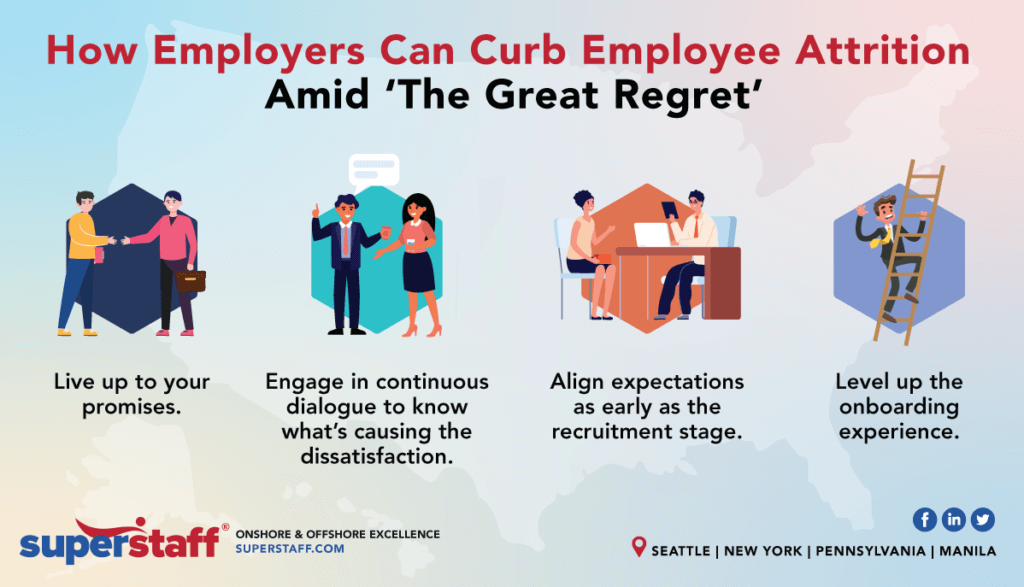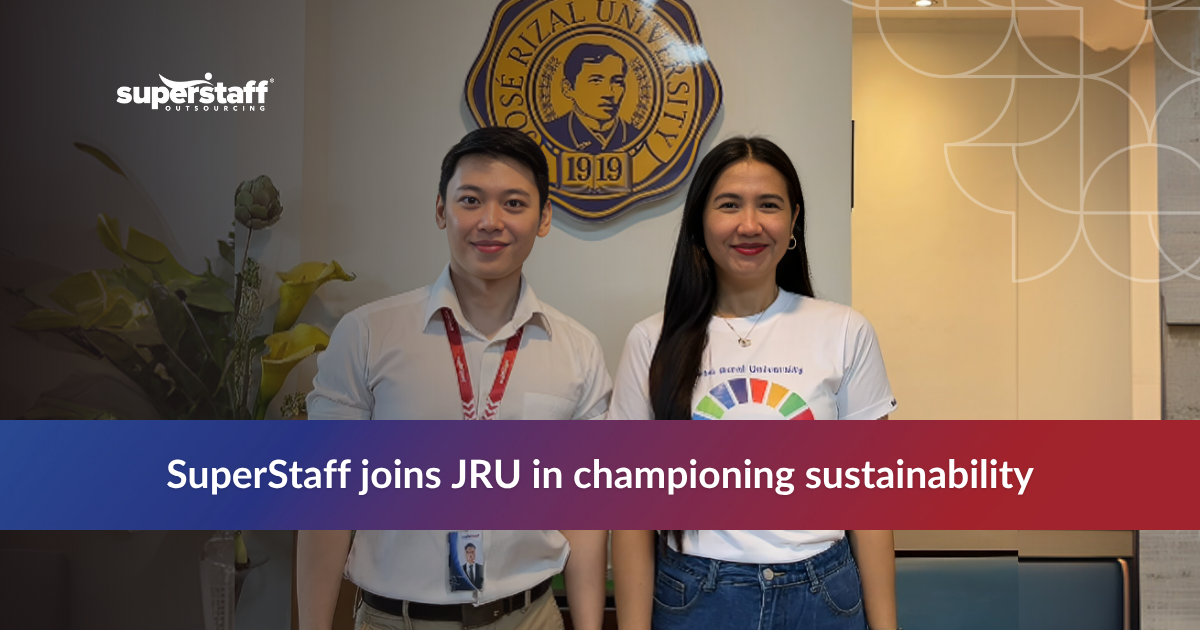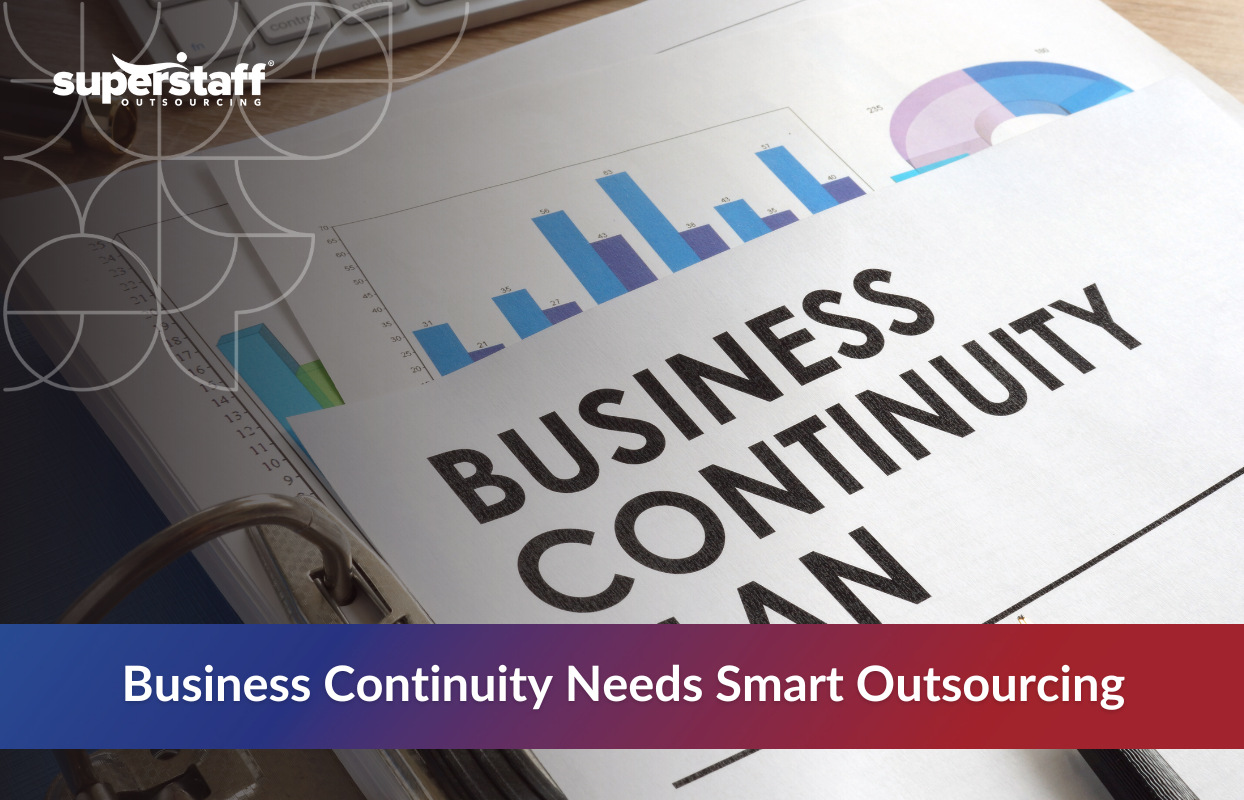
The honeymoon phase seemed to end rather quickly for many people who joined “The Great Resignation” (or what others argue as “The Great Reshuffle”). A survey revealed that 72% of young workers who shifted jobs or employers last year regretted their decisions. Hence, industry observers call the phenomenon “The Great Regret.”
What Is ‘The Great Regret’?
For those affected by “The Great Regret,” the experience is similar to being catfished. Some described it as having buyer’s remorse, wherein employees felt shortchanged after starting their new jobs.
The “Great Regreters” felt that the position, culture, environment, or all were different from what they were led to believe during recruitment. Others even feel like they didn’t switch employers at all, encountering the same issues that led them to leave previous employers in the first place.
‘The Great Regret’ Is About to Cause Another Wave of ‘Great Resignation’
Left unaddressed, “The Great Regret” can cause another significant disruption in an already-volatile labor market. The unofficial rule that one has to stay in a company for at least a year does not apply to many workers. Many of them are, once again, ready to head to the exit door. Recent studies show that:
- 48% of workers who joined “The Great Reshuffle” said they would try to get their old job back.
- 41% of recently hired employees experiencing “The Great Regret” are only giving their new jobs 2-6 months.
- Of the 29% of employees who took a new job the past year, 40% are looking for a new employer again.
- Only 26% of job switchers like their new jobs enough to stay.
Employers should take ‘The Great Regret‘ seriously as it can negatively impact employee attrition and retention rates. As analysts have said repeatedly, it is more expensive to train a new employee than to retain one.
How Employers Can Curb Employee Attrition Amid ‘The Great Regret’
1. Live up to your promises.
Employers must hold themselves accountable for their words despite the intense talent war. Just as how consumers expect brands to translate their core values into actions, employees expect employers to deliver the promises they make.
Organizations that fail to meet employee expectations risk losing top talents and hurting their employer branding.
Yes, time is of the essence in filling a vacancy, or reducing time-to-hire is essential, but consider this: what happens after an employee resigns after six months or less? You’re not only back to the drawing board. You also leave a significant dent in one of your essential talent war arsenals—your retention rate.
Prevent “The Great Regret” from causing another wave of employee attrition and impeding your business’s growth. Help your managers and human resources teams follow through with what was promised to your recruits. If needed, partner with a recruitment process outsourcing provider for support.
Remember that haste should not be made at all costs, even if speed is crucial in recruitment. It is vital to have foresight and think about the impacts of your actions in the long run. To win the talent war, gain the trust and respect of candidates by ensuring that job offers, company culture, and employee experience are advertised authentically. In the meantime, make sure to work on your company branding as well which includes having a professional logo design, incorporating your brand colors everywhere online, and having a good reputation overall.
2. Engage in continuous dialogue to know what’s causing the dissatisfaction.
Among the often-discussed narratives surrounding “The Great Resignation” are pandemic epiphanies. After rethinking their priorities and what they want out of work and life, many employees resign to pursue what they want or what sparks their interest and passion.
But as “The Great Resignation” continues to make it to the headlines, many workers, including those who joined “The Great Reshuffle,” found themselves having FOMO or fear of missing out. Many struggle with the thought that they may be settling for less after reading all the congratulatory messages their peers received on LinkedIn or other social media after landing a flashy new title or founding a cool new workplace.
In the age of hyper-connectivity, it is easy to fall into the trap of comparing oneself with others. Leaders will have to engage employees in ongoing dialogue to find out the root of their regrets.
Doing so can help the company identify areas for improvement while providing realistic guidance to younger talents. Research shows that workplace mentorship is valued by 83% of Gen-Z workers, saying they want their supervisors to care about their professional and personal lives.
Leaders should also realize that many workers are still dealing with the pandemic’s significant impact on their lives. According to McKinsey, many workers are tired and even grieving:
“They want a renewed and revised sense of purpose in their work.”
“They want social and interpersonal connections with their colleagues and managers.”
However, because of “The Great Resignation,” many leaders are also spread thin. Burdened with administrative duties, they may forget their most crucial roles involving people handling, management, and mentorship—all the backbones of excellent leadership.
If your organization is in a similar situation, it’s time to examine how much time your junior executives spent on non-core tasks. Find ways to help ease their burdens to focus on the essential things and enable them to curb the impacts of “The Great Regret.”

3. Align expectations as early as the recruitment stage.
Employers should learn or remember the value of setting realistic expectations right from the start. Recruiters and interviewers must be equipped to represent the company realistically and talk about both the company’s successes and challenges.
However, let’s not forget that recruiters and hiring managers are employees, too, and face staffing problems brought by “The Great Resignation.” Many of them are tired and on the brink of resignation themselves. Since the pandemic, 61% of recruiters have experienced increased stress levels, while 19% have reported a drastic increase in stress.
Pressured to fill job openings quickly, internal recruiters or hiring managers may inadvertently or even consciously make unrealistic promises to candidates. It is also possible that they have no complete or clear grasp of the company’s culture, especially if they underwent remote recruitment and were hired virtually during the pandemic.
Partnering with a recruitment outsourcing provider can provide your recruitment team with much-needed assistance to navigate “The Great Regret.” Recruitment process outsourcing enables businesses to gain access to:
- Recruiters with future-ready skills to support internal teams
- Data and insights to facilitate efficient talent sourcing processes
- Advanced recruitment tools and technologies
Read More: State of the US Labor Market in 10 Powerful Q1 Statistics
4. Level up the onboarding experience.
Since the pandemic, many of the workers hired have only undergone virtual recruitment and hiring processes. This means they never get to experience the company’s culture in real life.
Having candidates sign an offer does not guarantee that they stay in the company for the long haul. Even if they stay, it doesn’t ensure that they will remain engaged throughout their employee lifecycle.
Employers must see onboarding as a golden opportunity to win the new hires’ hearts, engagement, and commitments. According to recruiting software company Jobvite:
“The way that a new employee interacts with company culture is a major determining factor in their potential for success.”
Set your recruits up for success by providing an excellent onboarding experience. How exactly this should be executed vary from business to business, but at the least, the following should be present:
- Comprehensive product or services training
- An interactive and immersive introduction to company culture and teams
- Consistent feedback sessions that highlight both wins and areas for improvements
Suppose you lack expertise in the aforementioned areas or have a shortage of HR talents who can ensure an excellent onboarding experience. In that case, you may partner with a company that offers end-to-end recruitment outsourcing services. Take advantage of the human and technological resources recruitment process outsourcing offers to better shape employee experiences.
Read More:
Where To Find and How To Recruit Untapped Workforce Amid ‘The Great Resignation’
From ‘The Great Reshuffle’ to ‘The Great Regret,’ Recruitment Outsourcing Solutions Enable Businesses To Cope With Disruptions
Resignation is infectious. Now that virtually everything is visible online, it is easy for employers to embrace a herd mentality, leaving businesses not only with empty desks but with negative employer branding.
Prevent employee attrition from damaging your reputation as an employer. Allow SuperStaff to provide you with the support you need to deliver an excellent employee experience and combat “The Great Regret.” We are a BPO that offers end-to-end recruitment process outsourcing services.
From sourcing to onboarding, SuperStaff can provide you with scalable resources and services you need to gain an edge in the age of strict talent war. Contact us to learn more.






